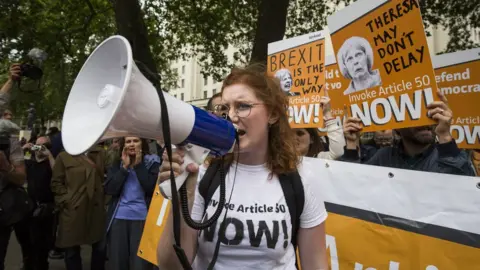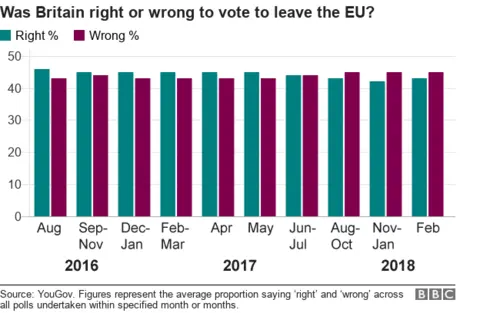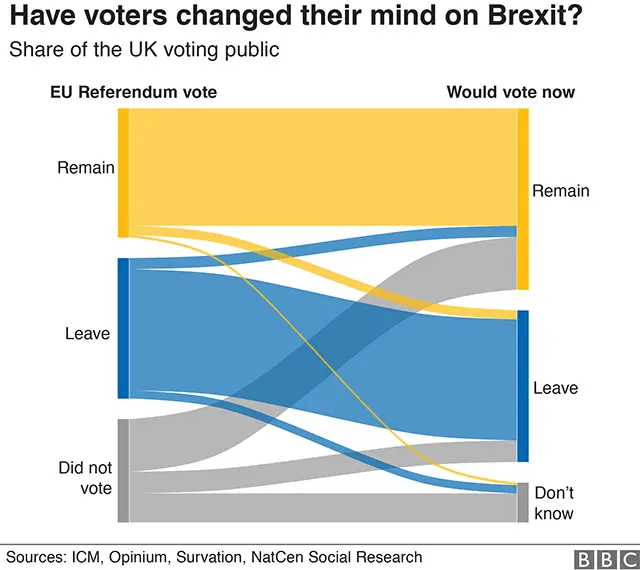Have voters changed their minds about Brexit?
 Getty Images
Getty ImagesWith little more than a year to go before the UK is due to leave the European Union, the issue of Brexit remains a divisive one. Where does public opinion currently stand?
Brexit continues apace, with controversy never far away.
The prime minister recently proposed the UK should leave both the single market and customs union. Labour countered that the country should remain in a customs union.
Former prime ministers Sir John Major and Tony Blair, have both suggested that Parliament should be prepared to vote down any "hard" deal and consider holding a second referendum - a possibility dismissed by Brexit campaigners.
None of this might matter if Theresa May had a safe overall majority in the House of Commons and a parliamentary party that was united in its support for Brexit.
But she has neither - and so speculation that the vote to leave the EU might yet be overturned continues.
However, is there any reason to believe the outcome might be different if the issue were to be put to voters once again?
After all, the result in June 2016 was relatively close - Leave won by 52% to 48% - so not many people would have to change their minds to produce a different verdict.
Polls that ask people how they would vote now in response to the question that appeared on the ballot paper in June 2016 have, in fact, been relatively few and far between.
But those that have been conducted suggest there may have been a small swing in favour of Remain.
The four most recent readings - taken by BMG Research and Survation between November and January - have, on average, once the 8% who said "don't know" are left to one side, put Remain on 52% and Leave on 48%.
In contrast, four such polls undertaken towards the end of 2016 still put Leave narrowly ahead, by 51% to 49%.
 Getty Images
Getty ImagesSimilarly, four recent polls - conducted by ICM and ComRes between December and March - that looked at how people might vote in a second referendum, albeit without posing the exact question that was on the ballot paper, have also on average put Remain slightly ahead - by 51% to 49%.
More regular readings of how voters now view Brexit have been provided by a question that YouGov have put to their respondents since shortly after the referendum.
This reads, "In hindsight, do you think Britain was right or wrong to vote to leave the EU?"
There is a clear, if hardly dramatic trend.

Up until last year's general election those who answered "right" narrowly outnumbered those who said "wrong".
Since the election the position has been reversed, with those saying that the decision is "wrong" slightly more numerous than those who replied "right".
So, all of the polling evidence points in the same direction - there appears to have been a slight drop in backing for Brexit such that the balance of opinion might now be the reverse of what it was in June 2016.
But at this point considerable caution is in order.
Opinion polls are not always wholly accurate. Polling is too hazardous an enterprise for the position to be otherwise.
When the polls are as close as they are on Brexit, the only sensible judgement we can make is that the outcome of any second referendum is too close to call.
All that can assuredly be said is that the UK is split down the middle on the subject, just as it was in June 2016.
The uncertainty about the outcome of any future referendum is underlined when we look under the bonnet of the polls.
The reason why most polls now have Remain narrowly ahead is not because more voters have switched from Leave to Remain than have made the journey in the opposite direction.

Rather, most of the movement is accounted for by the 28% who did not vote in 2016 now being much more likely to say they would vote Remain than Leave.
That suggests the outcome of any second ballot could well depend on who does and who does not vote - always something that is very difficult to forecast.
You may also be interested in:
But do voters want another referendum?
On this the message from the polls is even more uncertain.
There are, after all, many different possible kinds of second referendum.
It could be a straightforward rerun of the ballot held in June 2016.
Or a vote on the deal that is eventually agreed between the UK and the EU - where the alternative might, on the one hand, be staying in the EU and, on the other, leaving without any kind of deal.
Polling undertaken by Lord Ashcroft found that while rerunning the original ballot was decidedly unpopular (51% were against, 38% in favour), there was less opposition to a vote where the choice was the deal versus leaving without one (39% were in favour, 31% opposed, though 30% were unsure).
At the same time, it is not only the kind of second referendum that matters. So also does how the idea is presented to voters.
When, on numerous occasions, YouGov has asked whether "there should or should not be a referendum to accept or reject" the terms of the deal that is eventually negotiated with the EU, they have on average found only 33% in favour, and 46% against.
In contrast, when Survation has asked whether people support "holding a second EU referendum to allow the public to vote on a Brexit deal when the details are known" they have on average found 46% in favour and only 42% opposed.
Presenting a referendum as a way of putting voters in charge seemingly makes the idea rather more attractive.
But whether they will eventually be given that role remains to be seen.

About this piece
This analysis piece was commissioned by the BBC from an expert working for an outside organisation.
John Curtice is Professor of Politics, Strathclyde University, and Research Fellow, NatCen Social Research and The UK in a Changing Europe.

Edited by Duncan Walker. Charts by Tom Calver and David Brown.
